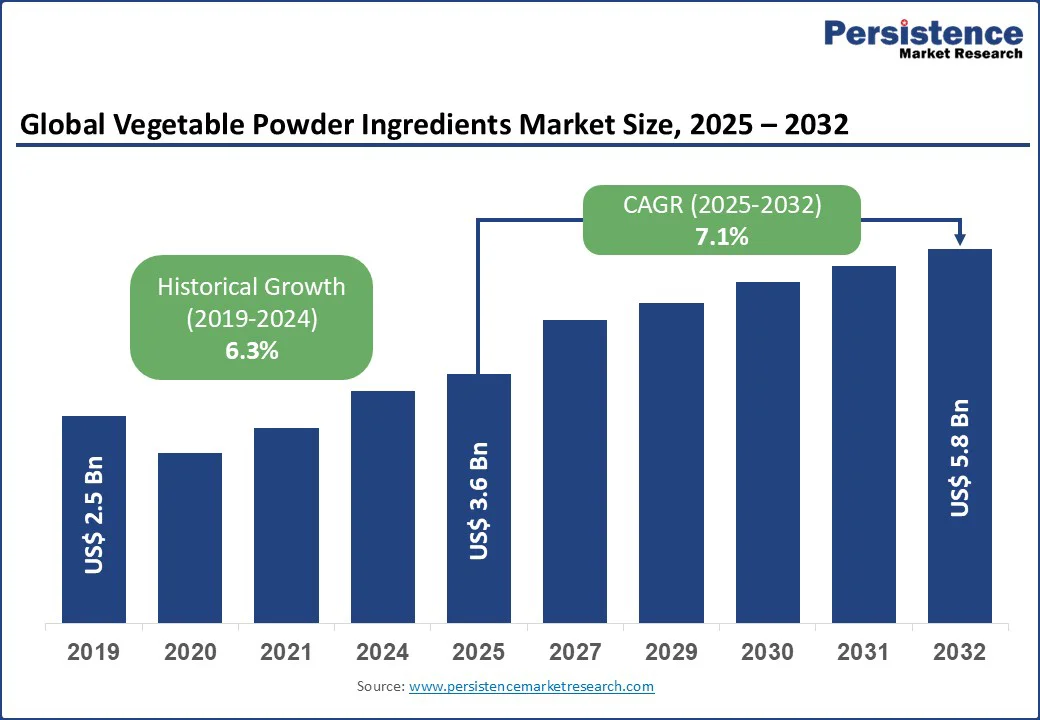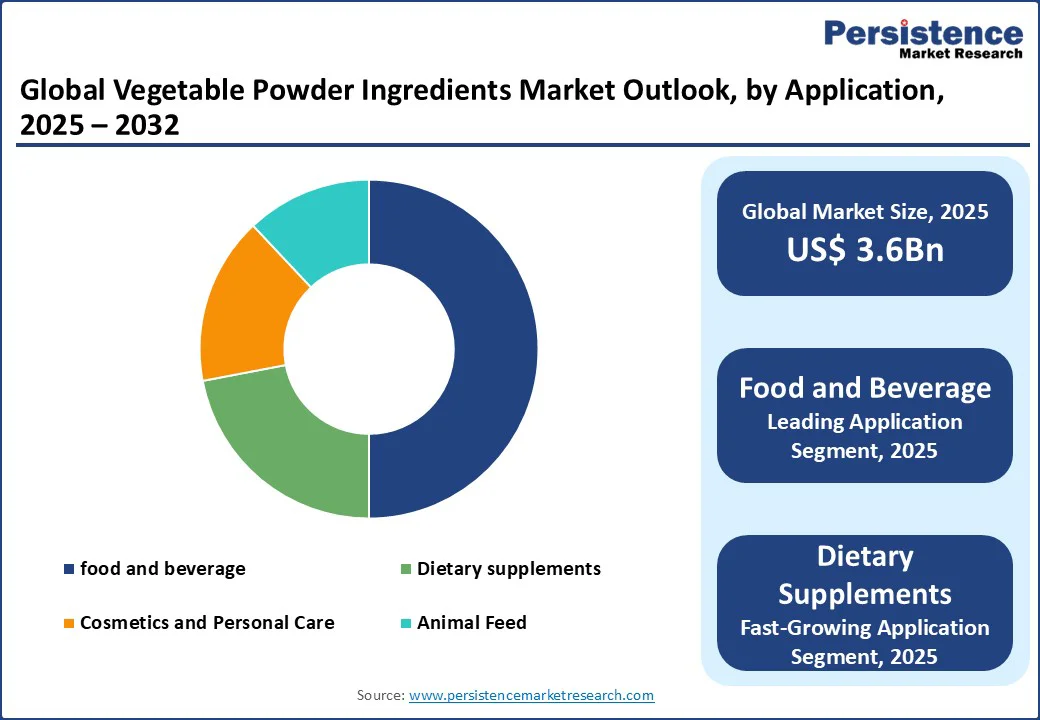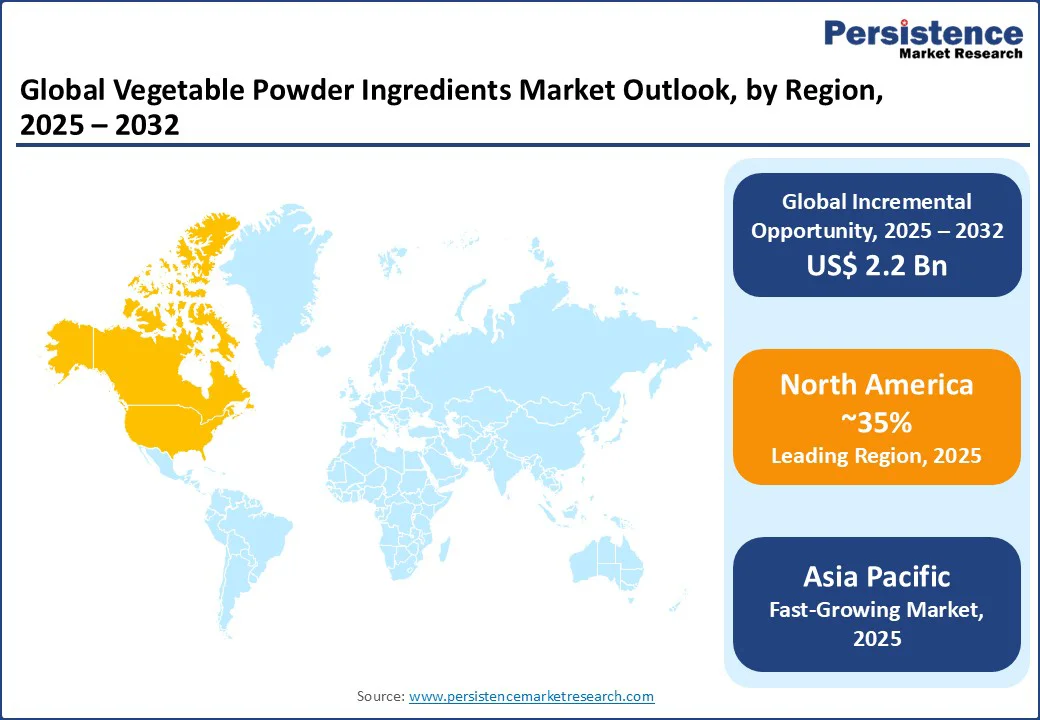ID: PMRREP32568| 187 Pages | 25 Sep 2025 | Format: PDF, Excel, PPT* | Food and Beverages

The global vegetable powder ingredients market size is likely to be valued at US$ 3.6 Bn by 2025 and is expected to reach US$ 5.8 Bn by 2032, growing at a CAGR of 7.1% during the forecast period from 2025 to 2032.
The vegetable powder ingredients market is driven by increasing consumer demand for natural and nutrient-rich food ingredients, advancements in processing technologies, and the rising popularity of plant-based diets.
Key Industry Highlights

| Key Insights | Details |
|---|---|
| Vegetable Powder Ingredients Market Size (2025E) | US$ 3.6 Bn |
| Market Value Forecast (2032F) | US$ 5.8 Bn |
| Projected Growth (CAGR 2025 to 2032) | 7.1% |
| Historical Market Growth (CAGR 2019 to 2024) | 6.3% |
The increasing consumer preference for plant-based diets and functional foods is a primary driver of the vegetable powder ingredients market. Consumers are increasingly seeking nutritious, convenient, and sustainable alternatives to traditional food products, driven by growing health consciousness, dietary restrictions, and ethical considerations.
Vegetable powders offer a concentrated source of vitamins, minerals, antioxidants, and fiber, making them an ideal ingredient for functional foods and beverages. They enable manufacturers to enhance the nutritional profile of products without compromising taste, texture, or shelf life.
In the food and beverage sector, vegetable powders are widely incorporated into soups, sauces, smoothies, snack bars, and ready-to-eat meals. For instance, companies such as Olam Specialty Ingredients and Ingredion have introduced kale, spinach, and carrot powders to fortify functional beverages and plant-based snacks, catering to health-conscious consumers.
Similarly, vegetable powders are increasingly used in nutraceuticals and dietary supplements, allowing brands to offer convenient, on-the-go solutions for immunity support, digestive health, and energy enhancement.
The high costs associated with producing organic and high-quality vegetable powders pose a significant restraint to market growth. Organic vegetables typically require certified farming practices, including the avoidance of synthetic pesticides and fertilizers, crop rotation, and soil management, which increase cultivation costs. These factors, combined with lower yields compared to conventional farming, contribute to higher raw material expenses.
Processing organic vegetables into powders involves additional costs for cleaning, blanching, drying, and grinding while maintaining nutrient retention and flavor. Specialized equipment and quality control measures are required to comply with organic certification standards, further elevating production expenses. Packaging and storage also add to the total cost, as organic powders often require moisture-proof, air-tight packaging to preserve freshness and extend shelf life.
For instance, companies such as Olam Specialty Ingredients and Ingredion, which produce certified organic kale, spinach, and carrot powders, face higher operational costs compared to conventional vegetable powders. These costs are often passed on to consumers, making organic vegetable powders more expensive and limiting their adoption among price-sensitive buyers.
As a result, despite growing demand for clean-label and functional products, high production costs remain a significant barrier to market expansion, particularly in emerging regions.
The growing adoption of vegetable powders in cosmetics and personal care products presents a significant opportunity for market expansion. Vegetable powders are rich in vitamins, antioxidants, and bioactive compounds, which offer multiple benefits for skin, hair, and overall wellness.
Ingredients such as carrot, spinach, kale, and beetroot powders are increasingly incorporated into face masks, creams, serums, shampoos, and soaps, providing natural nourishment, anti-aging effects, and improved skin radiance.
Rising consumer preference for clean-label, natural, and chemical-free personal care products is driving demand for plant-based ingredients, including vegetable powders.
For instance, companies such as L’Oréal and The Body Shop are exploring plant-derived formulations to enhance product efficacy while appealing to eco-conscious and health-aware consumers. Small and niche cosmetic brands are also leveraging vegetable powders to develop artisanal, organic skincare lines.
The integration of vegetable powders into personal care products aligns with trends in sustainable and cruelty-free cosmetics, offering both functional benefits and marketing appeal.
Powdered vegetable ingredients hold 46%market share in 2025 due to their versatility, ease of incorporation, and long shelf-life. Powders are widely used in food and beverage applications, such as smoothies, sauces, and baked goods, as well as in dietary supplements.
Companies such as MacroLife Naturals and BulkSupplements.com offer a wide range of powdered vegetable ingredients, catering to the growing demand for convenient, nutrient-rich products in North America and Europe.
Capsules are the fastest-growing segment, driven by their increasing use in dietary supplements. The convenience of capsules for delivering precise doses of vegetable-based nutrients appeals to health-conscious consumers.
The rise of e-commerce and direct-to-consumer sales channels has further boosted the adoption of vegetable powder capsules, with firms such as Olympian Labs Inc. and Life Extension expanding their offerings in this segment, particularly in the Asia Pacific and North America.
Leafy greens, such as spinach, kale, and spirulina, account for a 35% share in 2025, driven by their high nutritional content and widespread use in functional foods and supplements. These powders are popular in smoothies, protein bars, and health drinks, with companies such as Kuli Kuli Foods and Om Mushroom Superfood leading in North America and Europe due to strong consumer demand for superfoods.
Cruciferous vegetables, including broccoli, cauliflower, and Brussels sprouts, are the fastest-growing segment due to their antioxidant and detoxifying properties. The rising popularity of detox diets and functional foods in the Asia Pacific and North America is driving demand for cruciferous vegetable powders. Companies such as Eclectic Institute and Shoutgriin are innovating with broccoli sprout powders, targeting health-conscious consumers in urban markets.
The food and beverage segment contributes over 50% of market revenue in 2025, driven by the high adoption of vegetable powders in processed foods, functional beverages, and snacks.
Vegetable powders enhance flavor, nutrition, and color in products such as soups, sauces, and plant-based protein bars. Major players such as Country Farms and Iovate Health Sciences Incorporated supply vegetable powders for food processing, particularly in urban markets of North America and the Asia Pacific.
Dietary supplements are the fastest-growing application segment due to increasing consumer focus on preventive healthcare and personalized nutrition. Vegetable powders are used in multivitamin supplements, green superfood blends, and meal replacement shakes.
Companies such as Garden of Life and X Gold Health are innovating with supplement-grade vegetable powders, with rising demand in the Asia Pacific and Europe, where health and wellness trends are strong.

North America is projected to hold approximately a 35% share in 2025. The United States serves as the primary growth engine due to a combination of advanced infrastructure, consumer preferences, and regulatory support.
The region’s highly developed food processing and manufacturing capabilities enable efficient production, consistent quality, and wide-scale distribution of vegetable powders, making them readily available for use in various applications such as beverages, sauces, baked goods, and dietary supplements.
Europe represents a significant market for vegetable powder ingredients, with countries such as Germany, the UK, and France driving regional growth.
The region’s strong emphasis on sustainable and organic food production encourages the adoption of vegetable powders across multiple applications, including food and beverages, as well as cosmetics. Germany leads the European market due to its well-established food processing industry, advanced manufacturing capabilities, and high consumer demand for natural, clean-label ingredients.
Asia Pacific is emerging as the fastest-growing region in the vegetable powder ingredients market, propelled by increasing consumer interest in functional foods and dietary supplements.
In China, the expanding middle class and large consumer base are driving demand for vegetable powders across a variety of applications, including processed foods, beverages, and health-focused supplements. Consumers are increasingly seeking convenient, nutrient-rich options that align with modern lifestyles, creating opportunities for manufacturers to introduce innovative products that combine traditional ingredients with contemporary formats.
In India, a strong cultural focus on traditional and plant-based nutrition further supports market expansion, as consumers prioritize natural and wholesome ingredients in their diets. Companies such as Om Mushroom Superfood and Kiva are actively innovating within the region, developing vegetable powders sourced locally to meet regional taste preferences and dietary requirements.

The global vegetable powder ingredients market is highly competitive, comprising both global leaders and specialized regional players.
In North America and Europe, companies such as Kuli Kuli Foods, Olympian Labs Inc., Garden of Life, MacroLife Naturals, BulkSupplements.com, Life Extension, BioSchwartz LLC, and Naturelo lead through strong product portfolios, strategic partnerships, and innovation in natural, plant-based powders.
These firms focus on product diversification, organic certifications, and expanding their distribution networks to capture health-conscious consumers, leveraging R&D, sustainable sourcing, and direct-to-consumer online sales.
The global vegetable powder ingredients market is projected to reach US$3.6 billion in 2025.
The rising demand for plant-based and functional foods, along with advancements in processing technologies, is a key market driver.
The vegetable powder ingredients market is poised to witness a CAGR of 7.1% from 2025 to 2032.
The growing adoption of vegetable powders in cosmetics and personal care products is a key market opportunity.
Kuli Kuli Foods, Garden of Life, MacroLife Naturals, BulkSupplements.com, and Om Mushroom Superfood are key market players.
| Report Attribute | Details |
|---|---|
| Historical Data/Actuals | 2019 - 2024 |
| Forecast Period | 2025 - 2032 |
| Market Analysis | Value: US$ Bn, Volume: As Applicable |
| Geographical Coverage |
|
| Segmental Coverage |
|
| Competitive Analysis |
|
| Report Highlights |
|
By Form
By Product Type
By Application
By Region
Delivery Timelines
For more information on this report and its delivery timelines please get in touch with our sales team.
About Author